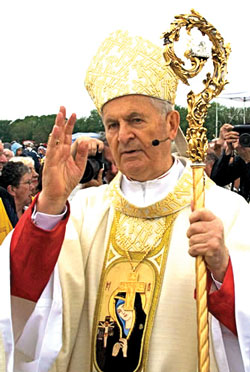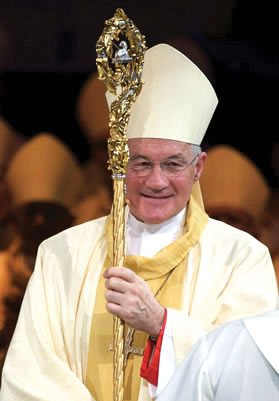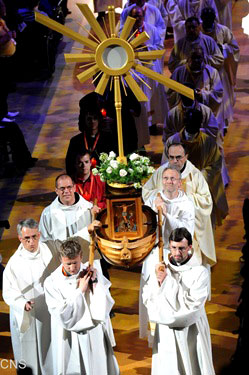The theme of the 49th International Eucharistic Congress was "The Eucharist, gift of God for the life of the world." As a matter of fact, Quebec City was founded four hundred years ago in 1608 by French explorer Samuel de Champlain, who came on a vessel named Don de Dieu (gift of God). The influence of this vessel’s name is reflected in the coat of arms and motto of Quebec City: "Don de Dieu, feray valoir (I shall put God’s gift to good use)".
Here are excerpts from Cardinal Tomko’s homily on Sunday, June 15:
 Jozef Cardinal Tomko Jozef Cardinal Tomko |
"The Eucharist is a gift of God. Not as an object, as the other gifts of God, but a very special one, because it is the gift of God himself. The Eucharist is Christ himself, a Person with His divine and human nature, given to us. It is the body and blood of the Risen Christ present with us under the sacramental signs of bread and wine.
"Before leaving this world, Jesus wanted to leave to his Church and to all of humanity the gift of his Presence. He has chosen the form of bread and wine. Since the beginning of his public life, in Capernaum, He has promised the bread of life: ‘The bread I will give is my flesh for the life of the world’ (Jn 6, 51). On the eve of His passion, in the Cenacle he took the bread and solemnly declared: ‘This is my body given up for you’. And He said over the wine: ‘Drink from it, all of you, this is my blood of the covenant, which will be shed on behalf of many for the forgiveness of sins’. He has accomplished only a few hours in advance of, and in a bloodless, sacramental manner, the sacrifice offered in bloody way on the Cross at Calvary. Jesus therefore instituted the Eucharist as His redemptive sacrifice. The Eucharist is a sacramental form of the sacrifice of Jesus on Cross, Cenacle and Calvary are just one sacrifice ‘for the life of the world’.
"This sacrifice happened only once, but Jesus wanted to apply and to perpetuate it through the centuries. Therefore He gave a commandment to His apostles: ‘Do this in memory of me’. It is a memorial and a command: not only to remember Him with speeches and words, but to do what He has done. From that time, the priests of his Church accomplish this sublime command doing the same action and pronouncing the same words. Through two thousand years the same words of Jesus consecrating the bread and wine resounds in each church. As Saint Paul testifies about the church of Corinth: ‘For as often as you eat this bread and drink this cup, you proclaim the death of the Lord until he comes’ (1Cor 11, 26).
"In each celebration of the Mass, Jesus Christ Himself is present with us in the situation of sacrifice as the Lamb of God who takes away the sins of our world, of our community: our sins. When the priest proclaims after the consecration: ‘This is the mystery of faith’, the people profess their faith in Christ’s sacrifice that is renewed at the altar: ‘We proclaim your death, Lord!’
"It is not a show, not a pure commemoration or remembrance, it is sacramental representation of this salvific event, a persevering memorial bringing its fruits to the faithful. The Sunday Mass is such a memorial. If we understand in depth the meaning of our weekly Eucharist, we will revise our frequentation to it. It will become clear for us why the martyrs of Abitine in Northern Africa declared to the pagan judge: ‘We cannot live without the (Sunday) Eucharist’ (‘Sine Dominico non possumus vivere’) and why they offered their lives for this conviction.
 Cardinal Ouellet with his new crosier Cardinal Ouellet with his new crosier |
"The Holy Mass, possibly with the Holy Communion, and the adoration of our Lord present among us in the Eucharist – are the main form of our response to such a great Love of God."
During the homily, Cardinal Tomko presented Quebec Cardinal Marc Ouellet with a large, ornate gold crosier as a gift from Pope Benedict. When Cardinal Ouellet was consecrated a Bishop by Pope John Paul II in Rome in 2001 as secretary of the Pontifical Congregation for promoting Christian Unity, he was not in charge of any diocese, so he did not receive any pastoral staff. When he was appointed archbishop of Quebec City in 2003, nobody thought about giving him one; this has been made up for now by the Pope.
 During the presentation of the gifts for the Mass on June 15, Msgr. Hermann Giguere, Superior of Quebec City’s Seminary, presented the chalice given by French king Louis XVI to the first bishop of Quebec City, François de Laval (who was beatified by Pope John Paul II in 1980). This chalice was used by Cardinal Tomko for the celebration.
During the presentation of the gifts for the Mass on June 15, Msgr. Hermann Giguere, Superior of Quebec City’s Seminary, presented the chalice given by French king Louis XVI to the first bishop of Quebec City, François de Laval (who was beatified by Pope John Paul II in 1980). This chalice was used by Cardinal Tomko for the celebration.
At the end of the Mass, the Eucharist was placed in a monstrance, which was hoisted atop the youth-inspired Ark of the New Covenant. Four clergymen carried the ark and monstrance outside of the arena to one of the several eucharistic adoration chapels, where pilgrims could pray throughout the week.
 In this special issue of the journal, MICHAEL, the reader will discover who are the true rulers of the world. We discuss that the current monetary system is a mechanism to control populations. The reader will come to understand that "crises" are created and that when governments attempt to get out of the grip of financial tyranny wars are waged.
In this special issue of the journal, MICHAEL, the reader will discover who are the true rulers of the world. We discuss that the current monetary system is a mechanism to control populations. The reader will come to understand that "crises" are created and that when governments attempt to get out of the grip of financial tyranny wars are waged. An Efficient Financial System, written by Louis Even, is for the reader who has some understanding of the Douglas Social Credit monetary reform principles. Technical aspects and applications are discussed in short chapters dedicated to the three propositions, how equilibrium between prices and purchasing power can be achieved, the financing of private and public production, how a Social Dividend would be financed, and, finally, what would become of taxes under a Douglas Social Credit economy. Study this publication to better grasp the practical application of Douglas' work.
An Efficient Financial System, written by Louis Even, is for the reader who has some understanding of the Douglas Social Credit monetary reform principles. Technical aspects and applications are discussed in short chapters dedicated to the three propositions, how equilibrium between prices and purchasing power can be achieved, the financing of private and public production, how a Social Dividend would be financed, and, finally, what would become of taxes under a Douglas Social Credit economy. Study this publication to better grasp the practical application of Douglas' work.  Reflections of African bishops and priests after our weeks of study in Rougemont, Canada, on Economic Democracy, 2008-2018
Reflections of African bishops and priests after our weeks of study in Rougemont, Canada, on Economic Democracy, 2008-2018 The Social Dividend is one of three principles that comprise the Social Credit monetary reform which is the topic of this booklet. The Social Dividend is an income granted to each citizen from cradle to grave, with- out condition, regardless of employment status.
The Social Dividend is one of three principles that comprise the Social Credit monetary reform which is the topic of this booklet. The Social Dividend is an income granted to each citizen from cradle to grave, with- out condition, regardless of employment status.Rougemont Quebec Monthly Meetings
Every 4th Sunday of every month, a monthly meeting is held in Rougemont.